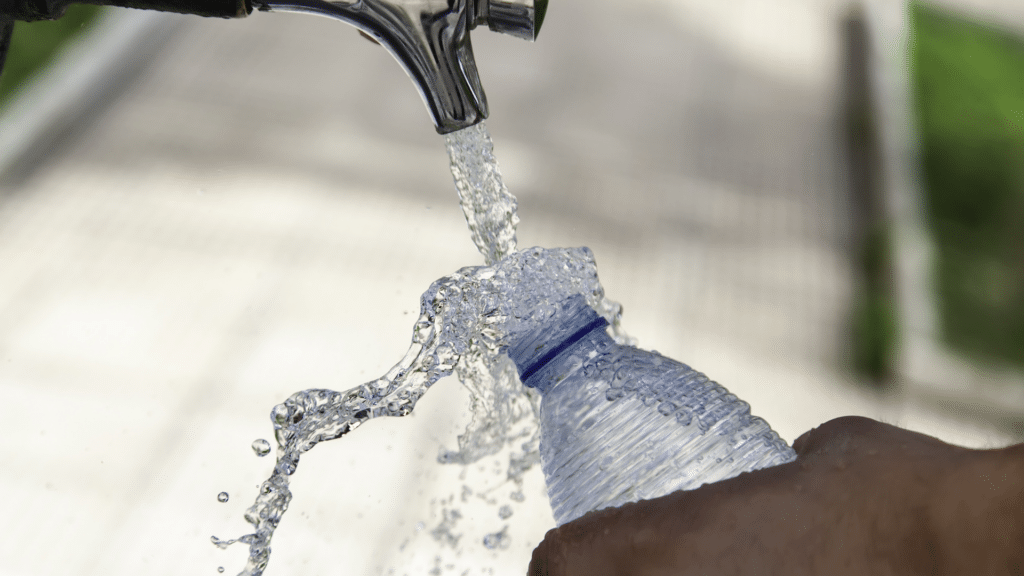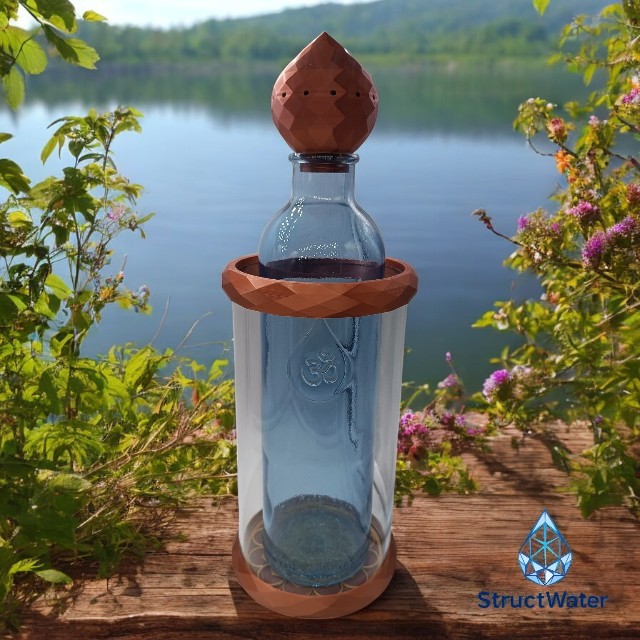Est-il mieux de boire l’eau du robinet ou l’eau en bouteille ?

Vous ne savez pas s’il vaut mieux boire l’eau du robinet ou l’eau en bouteille ? Vous ne savez pas choisir entre l’eau minérale et l’eau de source ? Si vous souhaitez prendre soin de votre santé en faisant attention à l’eau que vous buvez au quotidien, il est essentiel de connaître l’impact de chacune des méthodes sur votre santé mais aussi sur l’environnement ; pour ce faire, nous avons répondu à certaines de vos questions !
Alors que l’eau du robinet est souvent perçue comme une option économique et pratique, l’eau en bouteille offre une alternative pratique et portable. Toutefois, au niveau de la santé et du bien-être, les deux peuvent laisser à désirer… Nous vous invitons alors à prendre en considération toutes les informations que nous allons vous transmettre pour faire votre choix et vous assurer une consommation plus saine.
Eau en bouteille : eau de source ou eau minérale ?
Lorsqu’il s’agit de choisir entre eau du robinet et eau en bouteille, encore faut-il connaître la différence interne entre l’eau de source et l’eau minérale car il est important de comprendre leur implication respective sur la santé et le goût qu’elles ont.
L’origine
- L’eau de source provient d’une source naturelle, comme une nappe phréatique, et est généralement protégée contre toute contamination extérieure ;
- L’eau minérale, en revanche, est puisée à partir de sources souterraines riches en minéraux naturels qui lui confèrent ses caractéristiques distinctives en termes de composition chimique.
La composition
- L’eau de source est considérée comme ayant une composition plus neutre, avec des niveaux de minéraux généralement plus faibles que ceux de l’eau minérale ;
- L’eau minérale contient des quantités plus élevées de minéraux tels que le calcium, le magnésium et le potassium, ce qui peut lui conférer des propriétés bénéfiques pour la santé.
Le goût
En raison de leur composition chimique différente, l’eau de source et l’eau minérale peuvent avoir des saveurs distinctes. Certaines personnes préfèrent le goût plus léger et plus neutre de l’eau de source, tandis que d’autres apprécient la richesse minérale et la saveur caractéristique de l’eau minérale.
L’utilisation
- L’eau de source est utilisée comme une alternative à l’eau du robinet pour la consommation quotidienne, la cuisson et la préparation des aliments ;
- L’eau minérale est souvent consommée pour ses bienfaits potentiels pour la santé, notamment en tant que source supplémentaire de minéraux essentiels.
A savoir : “Toutes n’ont pas le statut d’eau potable, car elles peuvent contenir des minéraux en grande quantité” tels que le sodium , fluorure, sulfate et chlorure ; avertit Yvan Altchenko, enseignant-chercheur à AgroParisTech sur le campus de Montpellier. D’ailleurs, il recommandé de ne pas toujours boire les mêmes !
Est-ce que l’eau en bouteille est polluée ?
L’eau en bouteille peut être contaminée par des polluants provenant de diverses sources tout au long de son processus de production, d’embouteillage, de transport et de stockage. Par ailleurs, récemment, des industriels ont eu recours à des systèmes de filtration et de traitements désinfectants interdits sur les eaux naturelles normalement saines.
Toutefois, La Direction générale de la Santé assure que ces gisements restent, “de par leur nature”, “peu exposés à des risques de dégradation de leur qualité”.
A savoir : une étude menée par le ministère en 2013 mais dont le rapport a été publié en 2019, avait montré que 25% des échantillons analysés contenaient au moins une trace de composés chimiques, dont des résidus de pesticides et de bisphénol A, à des concentrations très largement inférieures aux valeurs limites.
Voici les risques liés au faire de boire une eau en bouteille par rapport à l’eau du robinet :
- Les microplastiques : des études ont révélé la présence de microplastiques dans certaines eaux en bouteille, ce qui peut être attribué à la contamination plastique de l’environnement, au processus d’embouteillage ou à l’emballage lui-même. Bien que les effets soient encore mal compris, il suscite des préoccupations croissantes ;
- Des substances chimiques : certains contaminants chimiques tels que les phtalates, les bisphénols et les composés organiques volatils peuvent également se retrouver dans l’eau en bouteille en raison de matériaux d’emballage plastique ou de processus de fabrication. Ces substances peuvent présenter des risques pour la santé à des concentrations élevées et prolongées ;
- Les bactéries et virus : bien que l’eau en bouteille soit généralement traitée pour éliminer les contaminants microbiologiques, il existe toujours un risque de contamination bactérienne ou virale si les procédures de fabrication et de stockage ne sont pas adéquates ;
- L’impact environnemental : outre la pollution potentielle de l’eau en bouteille elle-même, la production, le transport et l’élimination des bouteilles en plastique ont un impact significatif sur l’environnement, contribuant à la pollution, à la consommation d’énergie et aux émissions de gaz à effet de serre.
Nous vous encourageons à préférer des alternatives plus durables telles que l’utilisation d’un système de filtration d’eau à domicile ou le remplissage de bouteilles réutilisables à partir de sources d’eau potable sûres.
Est déconseillé de boire l’eau du robinet ?
L’eau du robinet est un produit contrôlé de manière régulière par les autorités sanitaires et les organismes de régulation dans de nombreux pays à travers le monde. Ces contrôles visent à garantir que l’eau du robinet répond aux normes de qualité de l’eau potable établies par les autorités compétentes, assurant ainsi sa sécurité pour la consommation humaine.
Ce suivi est réalisé tous les jours dans les grandes villes et de façon moins fréquente en zone rurale. Lorsque les analyses sont menées, ce sont pas moins de 70 paramètres qui sont contrôlés (bactéries, nitrates, arsenic, PFAS…) et chacun d’eux doit avoir un niveau qui ne doit pas dépasser des limites de qualité.
Grâce à ces contrôles réguliers et à la surveillance constante de la qualité de l’eau du robinet, les autorités sanitaires visent à garantir la protection de la santé publique en fournissant une source d’eau potable sûre, fiable et accessible à tous.
Que vous souhaitiez boire de l’eau du robinet ou de l’eau en bouteille, chacune de ces méthodes est contrôlée par des organismes et des autorités compétentes. Par ailleurs, notez que de nouvelles normes de contrôle de potabilité sont en cours pour assurer une qualité d’eau potable de qualité et ce sans faille !

structureur d'eau Struct'Water
- Garantie 5 ans
- Durée de vie 50 ans
- Eau prête à boire en 15 Minutes
Le concept Struct’Water vous intéresse ?
N’hésitez plus et commandez dès maintenant votre structureur d’eau et bénéficiez rapidement des biens faits d’une eau structurée. Paiement sécurisé et livraison rapide à domicile ou en point relais.
Vous pouvez nous contactez pour toutes questions et informations nécessaires, notre équipe est là pour vous.

